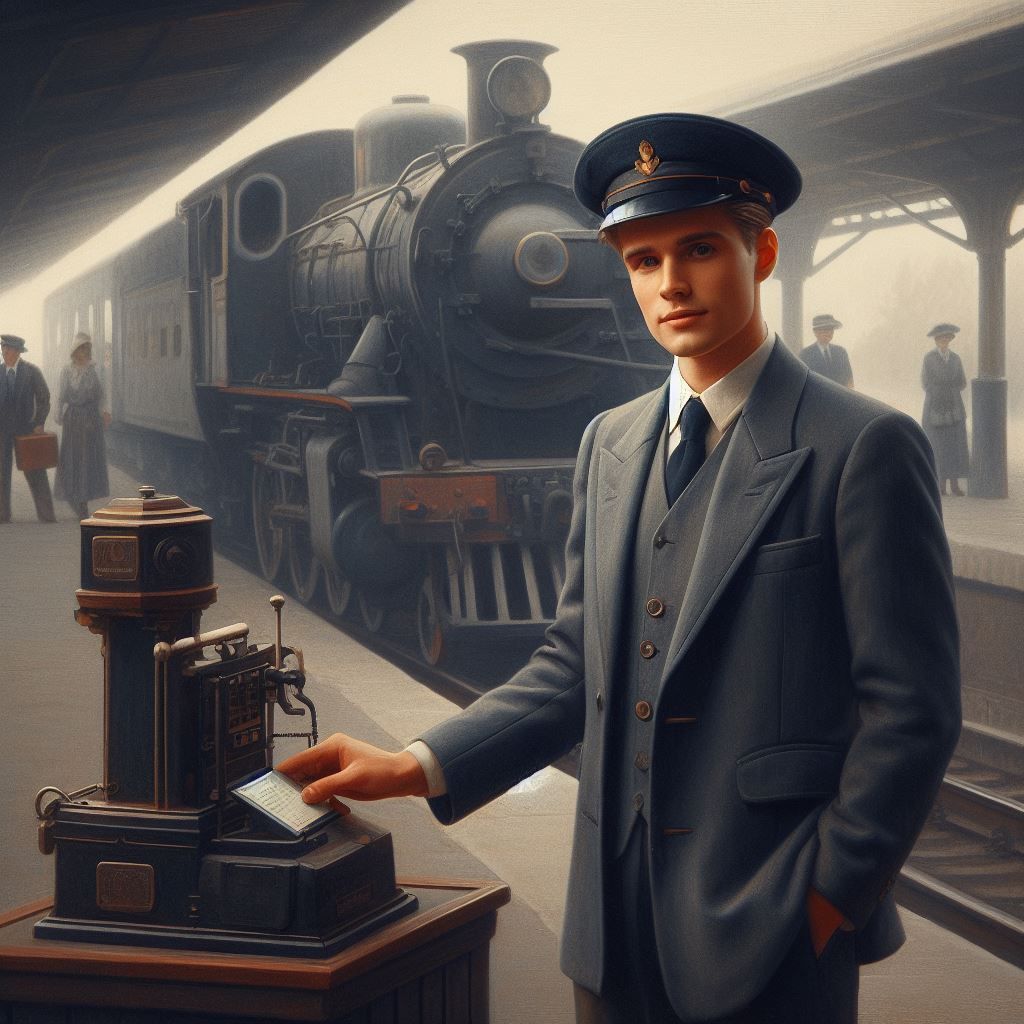Introduction
In the world of trains, train conductors play a crucial role in ensuring safe and efficient operations.
They are responsible for managing the movement of trains, coordinating with other crew members, and ensuring passenger safety.
To be a successful train conductor, several skills and qualities are required. Firstly, excellent communication skills are essential.
Conductors need to effectively communicate with the train crew, passengers, and other railway staff to ensure smooth operations.
Secondly, strong problem-solving skills are crucial. Train conductors often face unexpected situations such as mechanical issues or delays.
Being able to think on their feet and find solutions quickly is vital in keeping the train on schedule and ensuring passenger satisfaction.
Attention to detail is another important quality.
Conductors need to accurately record departure and arrival times, track passenger tickets, and ensure all safety procedures are followed.
One small oversight could have significant consequences.
Additionally, train conductors must have a strong sense of responsibility.
The safety of passengers and crew members is their top priority, and they need to take their duties seriously.
Physical fitness is also important for train conductors, as the job can be physically demanding.
They may need to climb on and off moving trains, lift heavy items, and stand for long periods.
Lastly, a train conductor must have a good understanding of railway rules and regulations.
They need to be familiar with the signaling systems, speed limits, and safety protocols to ensure a safe and efficient rail journey.
In essence, train conductors are indispensable in the railway industry.
Their skills in communication, problem-solving, attention to detail, responsibility, physical fitness, and knowledge of railway rules are essential for successful operations.
Technical Skills
In order to be a successful train conductor, there are several technical skills that are essential:
Knowledge of train operations and safety procedures
A train conductor must have a deep understanding of how train systems operate and must strictly adhere to safety protocols and procedures.
They need to have a comprehensive understanding of the different components of a train and how they function together.
Transform Your Career Today
Unlock a personalized career strategy that drives real results. Get tailored advice and a roadmap designed just for you.
Start NowBeing familiar with emergency protocols and knowing how to handle potentially dangerous situations is crucial.
Proficiency in operating various train equipment and controls
A train conductor needs to be proficient in operating the different equipment and controls found on trains.
They should have the ability to handle the train’s throttle, brake controls, and other instrumentation accurately and effectively.
Knowing how to troubleshoot and fix minor technical issues that may arise is also important.
Understanding of signaling systems and track layouts
Having a thorough understanding of signaling systems is crucial for a train conductor.
They need to be able to interpret and respond to signals correctly, ensuring a safe journey for passengers and cargo.
Knowing the track layout and being aware of speed limits and other track-related information is essential for safe operations.
Ability to read and interpret train schedules
A train conductor must possess the ability to read and interpret train schedules accurately.
They need to know departure times, arrival times, and the order of stops along the route.
Being able to make schedule adjustments in unforeseen circumstances or if delays occur is also important.
In conclusion, a successful train conductor must possess a strong foundation of technical skills.
They need to have in-depth knowledge of train operations and safety procedures.
Proficiency in operating train equipment and controls, understanding signaling systems, track layouts, and being able to read and interpret train schedules are all crucial for a train conductor’s success.
By mastering these technical skills, train conductors ensure the safe and smooth operation of train journeys, making the experience better for everyone involved.
Communication Skills
A successful train conductor must possess exceptional communication skills to effectively interact with crew members and passengers. These skills include:
Clear and Effective Verbal Communication
One of the vital skills for a train conductor is the ability to communicate clearly and effectively verbally.
They must be able to convey information, instructions, and announcements to both the crew and passengers in a concise and understandable manner.
Active Listening Skills
An essential skill for a train conductor is active listening.
They need to pay attention to passenger concerns, queries, and feedback to understand their needs and respond appropriately.
Active listening demonstrates empathy and helps in providing satisfactory solutions.
Ability to Give Clear Instructions and Announcements
A successful train conductor should have the capability to provide clear instructions and announcements to passengers.
Transform Your Career Today
Unlock a personalized career strategy that drives real results. Get tailored advice and a roadmap designed just for you.
Start NowThey should ensure that passengers understand safety procedures, schedules, and any changes or disruptions in service.
Clear instructions contribute to a well-organized and smooth train operation.
Strong Written Communication Skills
Train conductors also need strong written communication skills for reports and documentation.
They must be able to accurately record incidents, maintenance needs, and any other important information.
Strong written communication ensures clarity and facilitates efficient communication within the railway system.
Effective communication skills are crucial for a successful train conductor, as they play a significant role in maintaining a safe and comfortable journey for both the crew and passengers.
Problem-Solving Skills
Quick decision-making in emergencies or unexpected situations
Train conductors must possess excellent problem-solving skills to handle emergencies or unexpected situations that may arise during their journey.
Being able to make quick decisions is crucial to ensure the safety of passengers and the smooth operation of the train.
When faced with an emergency, such as a medical condition or a mechanical failure, the train conductor must swiftly assess the situation and determine the best course of action.
They may need to communicate with the train driver, other train staff, or emergency services to coordinate a response.
Furthermore, train conductors should be prepared to handle unexpected situations, such as severe weather conditions or disruptive passengers.
They need to be able to think on their feet and make decisions that prioritize safety and the well-being of everyone onboard.
Critical thinking to assess and resolve operational issues
In addition to emergencies, train conductors encounter various operational issues that require critical thinking skills to assess and resolve.
These issues can range from scheduling conflicts to equipment malfunctions.
For example, if there is a delay or a change in the train’s route, the conductor needs to analyze the situation and determine the best alternative to minimize the impact on passengers.
This might involve coordinating with station personnel, updating passengers on the situation, and ensuring the train stays on schedule as much as possible.
Train conductors also need to have a strong understanding of the technical aspects of train operations.
This enables them to troubleshoot problems with doors, signaling systems, or other mechanical components that may affect the train’s performance.
Adaptability to changing circumstances and diverse passengers
Another essential problem-solving skill for train conductors is adaptability.
They must be able to adjust their approach depending on the circumstances and the passengers they encounter.
Transform Your Career Today
Unlock a personalized career strategy that drives real results. Get tailored advice and a roadmap designed just for you.
Start NowTrain conductors often interact with diverse populations, including people with disabilities, non-native speakers, and individuals with varying levels of familiarity with train travel.
It is crucial for conductors to adapt their communication style and provide appropriate assistance to ensure all passengers have a comfortable and safe journey.
Moreover, train conductors must adapt to changes in train schedules, unexpected delays, or route modifications due to maintenance work or other factors.
This requires flexibility and the ability to quickly come up with solutions that minimize inconvenience for passengers while adhering to safety regulations.
Troubleshooting mechanical or technical problems on trains
Train conductors must possess basic troubleshooting skills to handle mechanical or technical problems that may arise during their shifts.
In cases where an equipment failure occurs, the conductor may need to diagnose the issue and attempt basic repairs or notify maintenance staff for further assistance.
By understanding the different components and systems of the train, conductors can play a vital role in resolving minor issues and ensuring the train’s smooth operation.
In situations where immediate repair is not possible, conductors need to communicate with passengers and provide regular updates on the progress of resolving the problem.
By keeping passengers informed, they can help manage expectations and maintain a sense of order.
In general, problem-solving skills are crucial for a successful train conductor.
Whether it be making quick decisions in emergencies, resolving operational issues, adapting to changing circumstances, or troubleshooting mechanical problems, these skills enable conductors to navigate challenges and ensure the safety and comfort of passengers throughout their journey.
Organizational Skills
A successful train conductor possesses excellent organizational skills, which are crucial for ensuring a smooth and efficient operation.
These skills are particularly important in the following areas:
Excellent time management to ensure adherence to schedules
Time is of the essence in the railway industry, and a successful train conductor must be a master of time management.
They should have the ability to effectively plan and organize their duties to ensure train departures and arrivals are on schedule.
This includes coordinating with the station staff and crew members to minimize delays and maximize efficiency.
Multitasking abilities to handle various tasks concurrently
Being a train conductor involves juggling multiple responsibilities simultaneously.
They need to be able to handle various tasks, such as communicating with dispatchers, operating onboard equipment, monitoring passengers’ safety, and addressing unforeseen issues.
Multitasking abilities are essential to ensure a safe and comfortable journey for passengers.
Attention to detail for accurate record-keeping and documentation
Accurate record-keeping and documentation are vital aspects of a train conductor’s role.
Transform Your Career Today
Unlock a personalized career strategy that drives real results. Get tailored advice and a roadmap designed just for you.
Start NowThey must pay close attention to detail while maintaining records of ticket sales, train movements, maintenance checks, and other important information.
This meticulousness ensures compliance with regulations and promotes smooth operations.
Proper management of crew and coordination with other staff
A train conductor must effectively manage their crew and maintain proper coordination with other staff members.
This involves assigning duties, providing clear instructions, and ensuring that everyone understands their roles and responsibilities.
Strong organizational skills enable the conductor to foster a cohesive team environment, resulting in efficient teamwork and seamless operations.
In fact, organizational skills play a crucial role in the success of a train conductor.
Excellent time management, multitasking abilities, attention to detail, and proper crew management are key aspects of being organized.
By mastering these skills, a train conductor can ensure the smooth and reliable operation of trains, leading to a positive experience for passengers and an efficient railway system as a whole.
Read: Stress & Mental Wellbeing of Air Traffic Controllers in the USA

Customer Service Skills
- A friendly and approachable demeanor towards passengers is essential for a successful train conductor.
- Patience and empathy are crucial qualities needed to effectively handle passenger concerns and complaints.
- Conflict resolution skills are necessary to manage difficult situations that may arise on board the train.
- A successful train conductor must be willing to go the extra mile to ensure passenger satisfaction.
Customer service skills are vital for a train conductor as they are responsible for the well-being and overall experience of the passengers.
Here are some key customer service skills that contribute to the success of a train conductor:
Friendly and approachable demeanor towards passengers
A warm and welcoming attitude is essential for creating a positive atmosphere on the train.
Greeting passengers with a smile and being attentive to their needs can go a long way in making them feel comfortable and valued.
It is important for a train conductor to establish a rapport with the passengers, making them feel at ease during their journey.
Patience and empathy to handle passenger concerns and complaints
Passengers may have various concerns or complaints during their train journey, ranging from ticketing issues to comfort-related matters.
A successful train conductor must possess the patience to listen attentively to these concerns and empathize with the passengers’ emotions.
By addressing their concerns in a calm and understanding manner, the conductor can help alleviate any anxiety or frustration experienced by the passengers.
Conflict resolution skills to manage difficult situations on board
Difficult situations may arise on board a train, such as conflicts between passengers or disputes regarding assigned seating.
In such instances, a train conductor must possess strong conflict resolution skills to defuse tension and maintain a harmonious environment.
By staying calm, impartial, and objectively assessing the situation, a successful train conductor can mediate and resolve conflicts effectively.
Transform Your Career Today
Unlock a personalized career strategy that drives real results. Get tailored advice and a roadmap designed just for you.
Start NowWillingness to go the extra mile to ensure passenger satisfaction
While the primary responsibility of a train conductor is to ensure the safety and smooth running of the train, going above and beyond to ensure passenger satisfaction is equally important.
This can include providing additional assistance to passengers with special needs, offering directions or recommendations, or even just engaging in friendly conversation to enhance the overall experience for passengers.
By demonstrating a genuine willingness to help and accommodate passengers, a train conductor can create a positive and memorable journey for everyone on board.
Basically, customer service skills play a crucial role in the success of a train conductor.
A friendly and approachable demeanor, along with patience, empathy, conflict resolution skills, and a willingness to go the extra mile, are key qualities that contribute to passenger satisfaction and a positive experience on the train.
Read: The Future of Air Tra ffic Control: Trends & Innovations in the U.S.
Safety Awareness
A successful train conductor possesses a high level of safety awareness, ensuring the well-being of both crew members and passengers.
This skill is essential for maintaining a secure environment throughout train operations.
Constant Vigilance to Ensure Compliance with Safety Regulations
One of the primary responsibilities of a train conductor is to enforce safety regulations.
Being constantly vigilant allows them to identify any potential safety violations and ensure that all crew members and passengers adhere to the established rules.
By maintaining a strong focus on safety, conductors can prevent accidents and promote a secure environment.
Proactive Identification and Mitigation of Potential Hazards
A successful train conductor must be proactive in identifying and mitigating any potential hazards that may arise.
This includes regularly inspecting the train and its equipment, ensuring that everything is in proper working order.
By identifying and addressing potential hazards beforehand, conductors can prevent accidents and maintain a safe environment for all.
Emergency Response Training for Prompt and Efficient Action
Train conductors undergo thorough emergency response training to be prepared for any unforeseen circumstances.
They are trained to respond promptly and efficiently in emergency situations, such as fires, medical emergencies, or accidents.
This training equips them with the necessary skills to protect and assist both crew members and passengers during critical situations.
Ability to Maintain a Safe Environment for Crew and Passengers
The ability to create and maintain a safe environment is crucial for a successful train conductor.
This includes ensuring that all safety measures are in place and that crew members and passengers feel secure throughout the journey.
Conductors must be proactive in addressing any safety concerns and taking necessary precautions to prevent accidents or hazards.
Transform Your Career Today
Unlock a personalized career strategy that drives real results. Get tailored advice and a roadmap designed just for you.
Start NowEssentially, safety awareness is a vital skill for a successful train conductor.
By remaining vigilant, proactively identifying and mitigating hazards, undergoing emergency response training, and maintaining a safe environment, conductors can ensure the well-being of both the crew and passengers.
This dedication to safety is essential for the smooth operation of train services and the overall satisfaction of everyone on board.
Read: How Air Traffic Control to U.S. Aviation Safety
Physical Fitness
A successful train conductor must possess a high level of physical fitness to meet the demands of the job. This includes:
Stamina and Endurance to Handle Long Shifts and Irregular Hours
Train conductors often work long shifts, sometimes lasting more than 12 hours, without many breaks in between.
They need to possess the stamina and endurance to withstand these demanding work hours.
The ability to stay focused and alert is crucial for ensuring the safety of passengers and the smooth operation of train services.
Ability to Navigate Trains and Perform Duties in Various Weather Conditions
Furthermore, train conductors must be fully capable of navigating through trains, regardless of the weather conditions.
Rain, snow, extreme heat, or cold temperatures should not hinder their ability to perform their duties effectively.
They need to be prepared to adapt to different weather situations and make quick decisions to guarantee passenger safety.
Proper Lifting Techniques for Moving Heavy Objects if Necessary
There may be instances when train conductors have to move heavy objects, such as luggage or equipment.
Understanding proper lifting techniques is essential to prevent injuries and strain on their bodies.
By employing correct lifting methods, conductors can avoid accidents and ensure their own well-being.
Overall Health and Wellness to Handle the Demands of the Job
Lastly, maintaining overall health and wellness is vital for train conductors.
They work in a dynamic and physically demanding environment, so they need to take care of their bodies.
Regular exercise, a nutritious diet, and sufficient rest are crucial for staying physically fit and ready to tackle the challenges that come with the job.
Generally, physical fitness is a key requirement for a successful train conductor.
The ability to endure long shifts, adapt to various weather conditions, lift heavy objects correctly, and maintain overall health and wellness are fundamental qualities necessary for excelling in this profession.
By prioritizing physical fitness, train conductors can ensure the safety, security, and efficiency of train operations, ultimately contributing to the satisfaction of both passengers and their colleagues.
Transform Your Career Today
Unlock a personalized career strategy that drives real results. Get tailored advice and a roadmap designed just for you.
Start NowRead: Day in the Life: Experiences of a U.S. Air Traffic Controller
Conclusion
A successful train conductor possesses a combination of skills and qualities that enable them to excel in their profession.
In this blog section, we discussed the top skills and qualities that make a train conductor successful.
Recapping the top skills and qualities discussed, we identified the importance of strong communication skills, problem-solving abilities, attention to detail, and the ability to work well under pressure.
These skills are crucial for ensuring the safety and efficiency of train operations.
Continuous learning and improvement are essential in the train conducting profession.
With the evolving technology and changing industry standards, train conductors must stay updated with the latest practices and regulations.
This ongoing dedication to learning allows them to adapt and perform at their best.
To aspiring train conductors, we encourage you to proactively develop and enhance these skills.
Seek opportunities to gain experience, attend training programs, and work on building relationships with colleagues and passengers.
Successful train conductors play a significant role in the transportation industry.
They are responsible for moving people and goods safely and efficiently, and their expertise contributes to the overall success of the industry.
Becoming a successful train conductor requires a combination of skills, continuous learning, and a passion for providing excellent service.
By developing these qualities, aspiring train conductors can embark on a rewarding and fulfilling career in the transport industry.
[E-Books for Sale]
The Big Book of 500 High-Paying Jobs in America: Unlock Your Earning Potential
$19.99 • 500 High-Paying Jobs • 330 pages
Explore 500 high-paying jobs in America and learn how to boost your career, earn more, and achieve success!
See All 500 High-Paying Jobs of this E-Book
1001 Professions Without a Degree: High-Paying American Jobs You Can Start Now
$19.99 • 1001 Professions Without a Degree • 174 pages
Discover 1001 high-paying jobs without a degree! Unlock career tips, skills, and success strategies for just $19.99!




